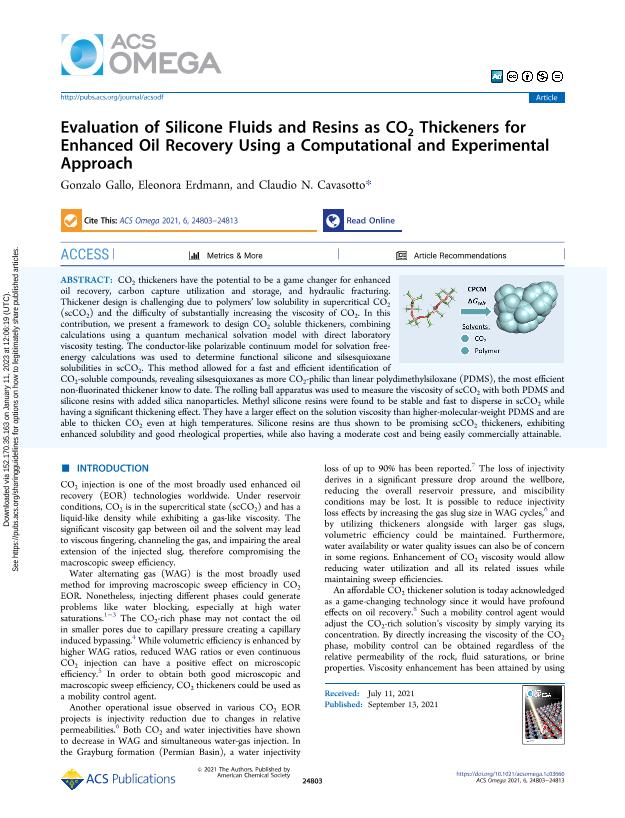Mostrar el registro sencillo del ítem
dc.contributor.author
Gallo, Gonzalo
dc.contributor.author
Erdmann, Eleonora

dc.contributor.author
Cavasotto, Claudio Norberto

dc.date.available
2023-01-11T12:16:18Z
dc.date.issued
2021-09
dc.identifier.citation
Gallo, Gonzalo; Erdmann, Eleonora; Cavasotto, Claudio Norberto; Evaluation of Silicone Fluids and Resins as CO2Thickeners for Enhanced Oil Recovery Using a Computational and Experimental Approach; American Chemical Society; ACS Omega; 6; 38; 9-2021; 24803-24813
dc.identifier.issn
2470-1343
dc.identifier.uri
http://hdl.handle.net/11336/184264
dc.description.abstract
CO2thickeners have the potential to be a game changer for enhanced oil recovery, carbon capture utilization and storage, and hydraulic fracturing. Thickener design is challenging due to polymers’ low solubility in supercritical CO2(scCO2) and the difficulty of substantially increasing the viscosity of CO2. In this contribution, we present a framework to design CO2soluble thickeners, combining calculations using a quantum mechanical solvation model with direct laboratory viscosity testing. The conductor-like polarizable continuum model for solvation free-energy calculations was used to determine functional silicone and silsesquioxane solubilities in scCO2. This method allowed for a fast and efficient identification of CO2-soluble compounds, revealing silsesquioxanes as more CO2-philic than linear polydimethylsiloxane (PDMS), the most efficient non-fluorinated thickener know to date. The rolling ball apparatus was used to measure the viscosity of scCO2with both PDMS and silicone resins with added silica nanoparticles. Methyl silicone resins were found to be stable and fast to disperse in scCO2while having a significant thickening effect. They have a larger effect on the solution viscosity than higher-molecular-weight PDMS and are able to thicken CO2even at high temperatures. Silicone resins are thus shown to be promising scCO2thickeners, exhibiting enhanced solubility and good rheological properties, while also having a moderate cost and being easily commercially attainable.
dc.format
application/pdf
dc.language.iso
eng
dc.publisher
American Chemical Society

dc.rights
info:eu-repo/semantics/openAccess
dc.rights.uri
https://creativecommons.org/licenses/by-nc-nd/2.5/ar/
dc.subject
ENHANCED OIL RECOVERY
dc.subject
RESINS
dc.subject
CO2 THICKENERS
dc.subject.classification
Otras Ingenierías y Tecnologías

dc.subject.classification
Otras Ingenierías y Tecnologías

dc.subject.classification
INGENIERÍAS Y TECNOLOGÍAS

dc.title
Evaluation of Silicone Fluids and Resins as CO2Thickeners for Enhanced Oil Recovery Using a Computational and Experimental Approach
dc.type
info:eu-repo/semantics/article
dc.type
info:ar-repo/semantics/artículo
dc.type
info:eu-repo/semantics/publishedVersion
dc.date.updated
2022-09-21T14:10:29Z
dc.journal.volume
6
dc.journal.number
38
dc.journal.pagination
24803-24813
dc.journal.pais
Estados Unidos

dc.description.fil
Fil: Gallo, Gonzalo. Instituto Tecnológico de Buenos Aires; Argentina
dc.description.fil
Fil: Erdmann, Eleonora. Consejo Nacional de Investigaciones Científicas y Técnicas. Centro Científico Tecnológico Conicet - Salta. Instituto de Investigaciones para la Industria Química. Universidad Nacional de Salta. Facultad de Ingeniería. Instituto de Investigaciones para la Industria Química; Argentina
dc.description.fil
Fil: Cavasotto, Claudio Norberto. Universidad Austral. Facultad de Ciencias Biomédicas. Instituto de Investigaciones en Medicina Traslacional. Consejo Nacional de Investigaciones Científicas y Técnicas. Oficina de Coordinación Administrativa Parque Centenario. Instituto de Investigaciones en Medicina Traslacional; Argentina
dc.journal.title
ACS Omega
dc.relation.alternativeid
info:eu-repo/semantics/altIdentifier/doi/http://dx.doi.org/10.1021/acsomega.1c03660
Archivos asociados
